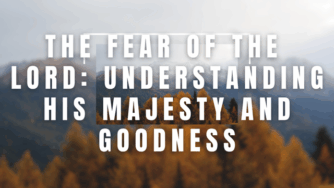Following Jesus Model of Love
Love is a word that is often overused and undercontemplated. In the bustling metropolis of Rome, amidst the clinking of chains and the shadows of prison walls, a letter penned by the apostle Paul to Philemon transcends the confines of its parchment. It speaks not only of legalities but of the essence of love, the cornerstone of the gospel message.
Paul, a seasoned traveler of faith, could have wielded his apostolic authority like a scepter, demanding compliance from Philemon. After all, Paul had poured his heart into the kingdom, sacrificing his freedom for the sake of Christ. But instead, he chooses a higher path, appealing not to duty but to love.
“For in Christ Jesus I became your father through the gospel. Therefore, I urge you to imitate me,” Paul writes in 1 Corinthians 4:15-16 (NIV). It’s a plea rooted not in entitlement but in relational depth, echoing the very heart of Christ’s love.
As Paul writes, he is not a free man, but a prisoner of Christ. His chains bear witness not to defeat but to a profound devotion to the cause of Christ. And from this place of captivity, he extends a plea, not for himself, but for Onesimus, Philemon’s runaway slave.
Onesimus, once a fugitive, now stands transformed by the power of Christ. In his veins flows a new spirit, no longer driven by fear and desperation but by the grace that flows from the cross. He could have sought freedom through illicit means, yet he chooses a different path—a path of redemption.
Paul’s words to Philemon resonate beyond the confines of their immediate context. They echo through the corridors of time, reminding us of the transformative power of Jesus. In a world that often values self-interest over sacrifice, Paul’s appeal serves as a timeless reminder—a call to embody the love that Christ so freely lavished upon us.
As we navigate the complexities of life, may we, like Paul, be guided by a love that transcends circumstance—a call that compels us to encourage one another, not out of obligation, but out of a genuine desire for the well-being of our brothers and sisters in Christ.
In Christ, we find a common ground—a love that beckons us to rise above cultural norms and societal expectations. It is this connection that empowers us to extend grace where it’s least expected, to forgive when it seems unreasonable, and to encourage one another to walk in the footsteps of our Savior, even when it defies the wisdom of the world.
So let us, dear friends, embrace this call to love—to be ambassadors of reconciliation, messengers of hope, and agents of grace. For in doing so, we bear witness to the transformative power of the gospel—a power that knows no bounds and extends an invitation to all who dare to believe.
The transformative power of God is a theme that permeates the entire biblical narrative. To further illuminate this, let’s delve into a story from the Old Testament, a story of unlikely friendship and enduring love that changed the course of history: the story of David and Jonathan.
David, a young shepherd boy, was chosen by God and anointed by the prophet Samuel to be the next king of Israel. At that time, Saul was the reigning king, and Jonathan was his son, the heir apparent. Under normal circumstances, Jonathan would have been seen as a rival to David. However, their relationship defied the norms of the day.
Jonathan recognized the anointing on David’s life and the favor of God upon him. Instead of harboring jealousy, Jonathan loved David as his own soul (1 Samuel 18:1-3). This deep bond between them was not born out of mere friendship but was a covenant relationship grounded in loyalty, mutual respect, and divine love.
Their friendship faced many trials. King Saul, consumed by jealousy and paranoia, sought to kill David. Despite his father’s intentions, Jonathan remained loyal to David. He warned David of his father’s plots and even risked his own life to protect him. In 1 Samuel 20:16-17, Jonathan makes a covenant with David, reaffirming his love and commitment, “So Jonathan made a covenant with the house of David, saying, ‘May the Lord call David’s enemies to account.’ And Jonathan had David reaffirm his oath out of love for him, because he loved him as he loved himself.”
Jonathan’s actions exemplify sacrificial love. He chose to support David’s God-ordained future over his own potential claim to the throne. This selfless love reflects the heart of Christ, who calls us to lay down our lives for our friends (John 15:13).
Through Jonathan’s example, we see that true Godly living involves sacrifice and a willingness to prioritize the needs of others. It calls us to act selflessly, putting the welfare of others above our own ambitions and desires. This type of faith transforms relationships and builds a community that reflects the kingdom of God.
The story of David and Jonathan is a powerful testament to the enduring nature of divine love and friendship. It shows us that a life rooted in God’s purposes transcends personal gain and societal expectations. Their covenant bond reminds us of the importance of loyalty, faithfulness, and mutual support in our relationships.
Another profound example of transformative power is found in the New Testament parable of the Good Samaritan (Luke 10:25-37). This parable, told by Jesus, illustrates the essence of love that goes beyond cultural boundaries and prejudices.
A lawyer, seeking to justify himself, asked Jesus, “And who is my neighbor?” In response, Jesus tells the story of a man traveling from Jerusalem to Jericho who fell into the hands of robbers. He was stripped, beaten, and left half-dead. A priest and a Levite, both religious leaders, saw the man but passed by on the other side, avoiding him.
However, a Samaritan, despised by the Jews, saw the injured man and was moved with compassion. He bandaged his wounds, poured on oil and wine, placed the man on his own donkey, brought him to an inn, and took care of him. The next day, he gave the innkeeper money and promised to reimburse any additional expenses.
Jesus asked, “Which of these three do you think was a neighbor to the man who fell into the hands of robbers?” The lawyer replied, “The one who had mercy on him.” Jesus then said, “Go and do likewise.”
This parable challenges us to reconsider our understanding of love and neighborliness. The Samaritan’s actions reflect a love that is active, selfless, and sacrificial. It crosses social barriers and meets the needs of others, regardless of their background or circumstances.
The Samaritan’s acts were not hindered by prejudice or fear. Instead, it was driven by compassion and a genuine desire to help. This kind of love requires us to step out of our comfort zones, to see others through the eyes of Christ, and to act with mercy and kindness.
In our modern world, where divisions and conflicts often arise, the message of the Good Samaritan is more relevant than ever. It calls us to extend truth to everyone, including those who may be different from us. It encourages us to break down walls of hostility and build bridges of understanding and compassion.
As we reflect on these biblical examples, let us consider how we can apply these principles in our own lives. How can we demonstrate the transformative power of God in our relationships, communities, and beyond?
One practical way to embody this call is through acts of kindness and service. Whether it’s helping a neighbor in need, volunteering in our community, or supporting those who are marginalized, our actions can reflect the love of Christ. Each act of kindness, no matter how small, contributes to a ripple effect that can transform hearts and lives.
Moreover, our words hold power. Speaking words of encouragement, affirmation, and charity can uplift others and create a positive impact. As Proverbs 16:24 (NIV) reminds us, “Gracious words are a honeycomb, sweet to the soul and healing to the bones.” Let us be intentional in using our words to build others up and spread the good news with everyone.
Prayer is another vital aspect of demonstrating Christ-like living and love. Praying for others, including those who may have wronged us, fosters a heart of compassion and forgiveness. It aligns our hearts with God’s will and opens us up to His transformative power. As we intercede for others, we invite God to work in and through us.
Forgiveness is also a crucial component of love. Holding onto grudges and resentment hinders our ability to love fully. Jesus taught us to forgive others as we have been forgiven (Matthew 6:14-15). By extending forgiveness, we release ourselves and others from the chains of bitterness and open the door to healing and reconciliation.
Furthermore, building genuine relationships rooted in love requires us to invest time and effort. It involves listening, empathizing, and being present for others. In a world where busyness often takes precedence, making time for meaningful connections can make a significant difference. These relationships become a source of support, encouragement, and mutual growth.
As a church community, we have a unique opportunity to model the love of Christ to the world. By fostering an environment of inclusivity, acceptance, and love, we create a space where people can experience the transformative power of the gospel. This involves welcoming those who are different, reaching out to the hurting, and creating a culture of grace and compassion.
In our personal lives, let us strive to love as Christ loved us. This means loving our families, friends, neighbors, and even our enemies with a love that is unconditional and selfless. It means showing patience, kindness, and humility in our interactions. It means being a reflection of God’s love in a world that desperately needs it.
To further explore the depth of transformative love, let’s consider another profound story from the Bible—the story of Ruth and Naomi.
Ruth, a Moabite woman, faced a challenging and uncertain future after the death of her husband. Her mother-in-law, Naomi, also suffered great loss, losing her husband and both sons. In the face of adversity, Naomi decided to return to her homeland of Bethlehem, urging her daughters-in-law to stay in Moab and find new husbands.
Orpah, one of the daughters-in-law, tearfully agreed and stayed behind. But Ruth, displaying remarkable loyalty and love, refused to leave Naomi. Her words in Ruth 1:16-17 (NIV) are a testament to her unwavering commitment: “Don’t urge me to leave you or to turn back from you. Where you go I will go, and where you stay I will stay. Your people will be my people and your God my God. Where you die I will die, and there I will be buried. May the Lord deal with me, be it ever so severely, if even death separates you and me.”
Ruth’s love for Naomi was not based on obligation but on a deep, selfless commitment. She left her homeland, her family, and her culture to accompany Naomi to a foreign land. This act of love and devotion set the stage for a remarkable journey of redemption.
In Bethlehem, Ruth worked tirelessly to provide for Naomi, gleaning in the fields to gather food. Her diligence and kindness caught the attention of Boaz, a relative of Naomi’s late husband. Boaz extended kindness and protection to Ruth, recognizing her loyalty to Naomi.
Through a series of divinely orchestrated events, Ruth and Boaz’s relationship blossomed, leading to their marriage. Ruth, the foreigner, became part of the lineage of David, and ultimately, the genealogy of Jesus Christ. Her story is a powerful example of how love, faithfulness, and obedience to God can bring about transformation and redemption.
Ruth’s love for Naomi, and Boaz’s love for Ruth, illustrate the ripple effect of God’s love in action. Their story demonstrates that love involves sacrifice, loyalty, and a willingness to go beyond our comfort zones. It shows that God’s love knows no boundaries and can bring about miraculous changes in our lives and the lives of those around us.
As we draw inspiration from Ruth’s story, let us consider how we can embody this kind of love in our daily lives. How can we show unwavering commitment and selfless love to those in need? How can we extend kindness and support to those who are marginalized or facing difficult circumstances?
In the context of our church community, we can create programs and initiatives that support individuals and families in need. This could include providing food, clothing, shelter, and other essential resources. By coming together as a community, we can make a significant impact and demonstrate the love of Christ in tangible ways.
Mentorship and discipleship programs are also vital in fostering love and growth. By investing time and effort in mentoring others, we can guide them on their spiritual journey and help them navigate life’s challenges. This creates a supportive network where individuals can experience the love and encouragement of the body of Christ.
Outreach initiatives, such as visiting the sick, elderly, or imprisoned, are practical ways to demonstrate love and compassion. These acts of service reflect the heart of Christ and remind those in need that they are not forgotten. It is through these small acts of love that we can make a significant difference in someone’s life.
Furthermore, advocating for social justice and standing up against injustice are expressions of love in action. As followers of Christ, we are called to be a voice for the voiceless and to work towards a more just and equitable society. This involves challenging systems of oppression, advocating for the marginalized, and promoting the dignity and worth of every individual.
In our personal lives, let us strive to build relationships that reflect the love of Christ. This means being present, listening with empathy, and offering support in times of need. It means celebrating each other’s successes and standing by each other in times of difficulty. It means being a source of encouragement, hope, and love.
As we embrace the call to love, let us remember that we are not alone in this journey. God’s love empowers us and gives us the strength to love others. Through the power of the Holy Spirit, we can extend grace, forgiveness, and compassion to those around us.
In conclusion, the transformative power of love is at the heart of the gospel message. From Paul’s appeal to Philemon, to the friendship of David and Jonathan, the compassion of the Good Samaritan, and the loyalty of Ruth, we see that love has the power to change lives and bring about redemption.
As we navigate the complexities of life, may we be guided by a love that transcends circumstance—a love that compels us to encourage and support one another, not out of obligation, but out of a genuine desire for the well-being of our brothers and sisters in Christ.
Let us embrace this call to love—to be ambassadors of reconciliation, messengers of hope, and agents of grace. For in doing so, we bear witness to the transformative power of the gospel—a power that knows no bounds and extends an invitation to all who dare to believe. May our lives be a testament to the love of Christ, and may we continue to spread this love to the ends of the earth.






